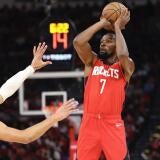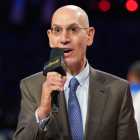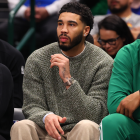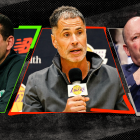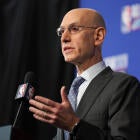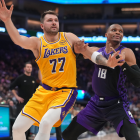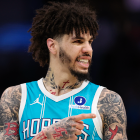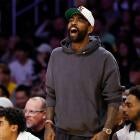Lakers vs. Grizzlies: One lineup change Los Angeles needs to consider for Game 3
The Lakers are getting killed whenever Anthony Davis rests
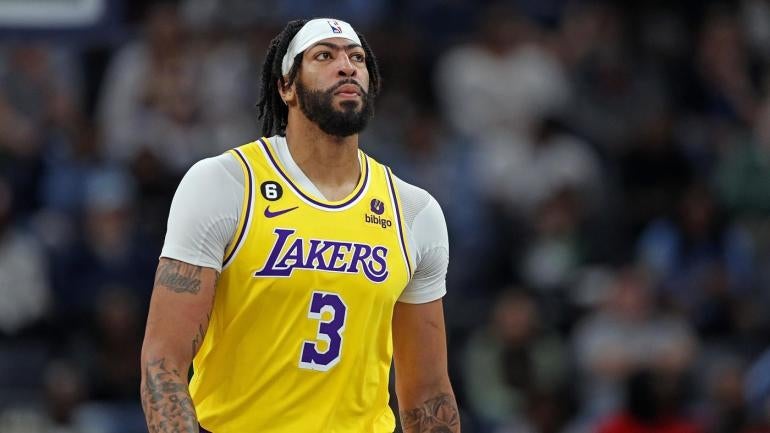
There was a time not so long ago when the Los Angeles Lakers arguably had too many centers. The presence of players like Dwight Howard, JaVale McGee, Andre Drummond, Montrezl Harrell and DeAndre Jordan both forced and allowed Anthony Davis to play the wrong position far too often. This came with a number of drawbacks, but one of the major positives was that the Lakers never lacked size. Whether Davis was in the game or out of it, the Lakers could reliably protect the basket.
The 2022-23 Lakers are significantly smaller. For the first time in his career, Davis has abandoned the power forward position entirely to play center exclusively. Right now, his minutes are going exactly as planned. The Lakers have outscored the Memphis Grizzlies by 23 points in the 74 minutes or so that Davis has played against them in the first round. Where they've run into trouble has been the minutes they've spent without him. Right now, the Lakers don't have enough centers.
So far in this series, they've used only one: Davis. When he leaves the game? LeBron James and Rui Hachimura take on center duties, and it's gone badly. The Lakers are minus-17 in the 22 minutes Davis has rested. There's room for offensive regression, as lineups featuring James without a typical big man tend to score quite well based on speed and spacing. Where they're getting killed, though, is on defense.
When Davis plays, the Lakers are allowing 100.7 points per 100 possessions. When he's gone to the bench, the Grizzlies have amassed a staggering 129.2 offensive rating. There's not much strategic brilliance behind that figure. Hachimura simply isn't a center. He's hardly even a deterrent to Desmond Bane as a driver.
He's too small to handle Jaren Jackson Jr. straight up as well.
Typically, one of the tradeoffs involved in eschewing a center defensively is that the lost size translates to better mobility. There is some truth to that, but generally, Hachimura has struggled to stick with Grizzlies guards one-on-one.
This isn't exactly Hachimura's fault. He has other defensive virtues, and he more than justifies his playing time on offense. He rarely ever played center with the Washington Wizards, and Kyle Kuzma failed as a small-ball center for the Lakers for many of the same reasons. The center position is the literal and figurative center of a defense. Hiding the weaknesses of the player responsible for standing between the opponent and the rim is difficult. Centers are dragged into almost every offensive action in some way or another. The Lakers tried to combat this a bit by experimenting with a 2-3 zone in Game 2. It went poorly.
Even when the Lakers have forced misses, their defensive rebounding rate thus far in this series has dropped from 78.3% with Davis in the game to 61.1% with anyone else in his place. This isn't exclusively a center problem. Removing Davis creates a trickle-down size issue that affects the entire Laker lineup. Troy Brown Jr. simply gets brushed aside here for interior position as John Konchar tips it in.
The Lakers tinkered with Jarred Vanderbilt as their backup center in the second half of Game 2. The defensive results were better. While Vanderbilt is best used on the perimeter and comes with similar size issues against Jackson and as a rim-protector, he is at least serviceable in that slot defensively. The downside is that his presence saps the no-center lineups of their offensive potency. His presence leads to too many plays like this.
Vanderbilt is treated like a center offensively even if he's more of a wing defensively. Using him in this way, therefore, robs the small-ball lineups of the space they need to survive without balancing things out on the defensive end of the floor. These lineups don't need to win their minutes. They need to survive them so that the minutes Davis wins can lead to outright victories on the scoreboard. If they keep getting outscored by roughly a point per minute whenever he sits, the bar is simply going to be too high for him to overcome.
And considering how low the bench bar is right now, it is worthwhile for the Lakers to consider actually using one of their reserve big men. Wenyen Gabriel plays with great energy, but he comes with the same size restraints as Hachimura. Tristan Thompson signed less than two weeks ago. Odds are, he isn't ready.
So what about Mo Bamba? The Lakers added him at the trade deadline and have a hefty $10.3 million decision to make on him this offseason. In a perfect world, they would've used the regular season to evaluate him and decide whether or not he was worthy of playoff minutes. He's played 88 minutes as a Laker due to a high-ankle sprain. There's not exactly much for the Lakers to learn on that tape.
But the Lakers acquired him due to his relatively rare combination of size and shooting. Though that combination remains largely theoretical, the upside of a 36% 3-point shooter with a 7-10 wingspan is considerable. Bamba gave the Orlando Magic 26 good minutes per night as a starter during the 2021-22 season. The Lakers wouldn't even need half of that to survive against Memphis.
There's a reason Darvin Ham hasn't tried it yet. Playoff minutes are precious. One bad stretch can swing a game, so they rely on who they trust. Bamba didn't have the chance to earn that trust yet. It's also not as though every Laker who has it has made the most of it. Troy Brown Jr. has played 28 minutes in this series, made a single shot and been outscored by seven while on the floor. The Lakers wouldn't need to pull a key contributor off of the floor here. There isn't much to lose when you've been outscored by 17 points in 22 minutes.
Roster balance has been a problem for the Lakers for the entire half-decade James has spent on the team. Getting away from the "too many centers" approach was a net positive. But that doesn't mean Davis needs to be the only one on the team. It's time for the Lakers to try bigger lineups when their only reliable center needs a break.





